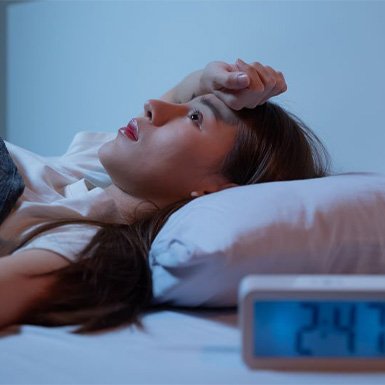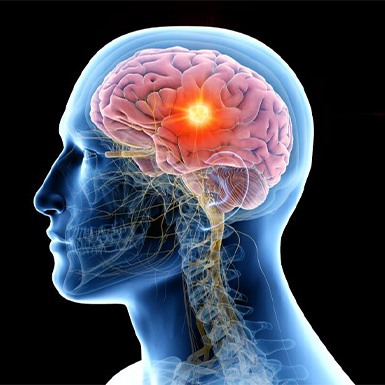Central Sleep Apnea – Aspen Hill, MD
Understanding the Less Common Type of Sleep Apnea
When people talk about sleep apnea, they are usually referring to obstructive sleep apnea (OSA), which is the most common form of the disorder. However, many people suffer from central sleep apnea (CSA), which is similar to OSA in some ways but completely different in others. What exactly is CSA, and how can you tell if you should talk to a doctor about it? This page explains what you should know.
What Is Central Sleep Apnea?

Just like OSA, central sleep apnea causes repeated pauses in breathing throughout the night. These episodes can occur dozens or hundreds of times. Because this condition continually disrupts the sleep cycle, it can rob a person of the rejuvenating rest they need to function and feel their best.
Unlike OSA, CSA is not caused by tissues in the throat blocking the airway. Rather, it is a neurological condition in which the brain fails to send proper breathing signals to the rest of the body.
What Causes Central Sleep Apnea?

CSA may have a number of different causes, such as:
- Cheyne-Stokes breathing. About half of all CSA sufferers have this condition. It is characterized by a dangerous cycle in which a person’s breathing repeatedly speeds up, slows down, stops, and then starts again.
- Some narcotic medications, including morphine and oxycodone, are associated with an increased risk of central sleep apnea.
- CSA is more frequent among individuals who sleep at an elevation above 8,000 feet. This may be because there is less oxygen at higher elevations.
- Medical conditions. Kidney failure, heart failure, Parkinson’s disease, and stroke are all risk factors for CSA.
In certain cases, there is no identifiable cause of CSA. This is known as primary CSA or idiopathic CSA.
Possible Complications of Central Sleep Apnea

CSA is nothing to take lightly! In fact, it is associated with an increased risk of some serious health conditions, including:
- Heart attack
- Heart failure
- Uneven heartbeat
- Stroke
- Obesity
- Diabetes
- Hypertension (high blood pressure)
If you are already struggling with significant health problems, CSA may worsen your symptoms and make your overall wellness more difficult to manage. For example, frequent bouts of low-quality sleep can interfere with the hormones that control hunger, which can make it more difficult for diabetics to eat a healthful diet.
When Should You See a Sleep Doctor?

You may need to talk to your doctor if:
- Your partner has noticed that you sometimes stop breathing at night.
- You are frequently exhausted despite sleeping for 7 – 8 hours.
- Low energy levels make it difficult for you to concentrate at work.
- You experience mood swings or depression.
- You have risk factors for central sleep apnea.
If your doctor suspects that you have sleep apnea, they can help you arrange to undergo a sleep test. This non-invasive diagnostic procedure will reveal whether you have OSA or CSA, as well as how severe your condition is. Once you receive a diagnosis, you can start to learn about treatment options.
Often, the best treatment for CSA depends on what is causing it. For example, your doctor may need to adjust some of your prescriptions. Some patients, particularly those with signs of both CSA and OSA, can benefit from CPAP therapy or a custom oral appliance from a dentist.
